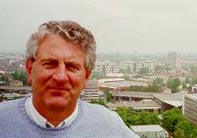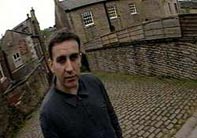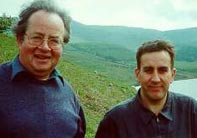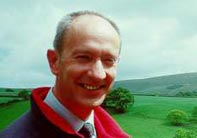Terry Hall is a great pop star, with a perfect look, a cooly laconic voice and a knack for anticipating pop trends. As the frontman for The Specials, he shot to stardom in Britain in the early ’80s, singing such classic ska-revival singles as "Gangsters", "Too Much Too Young" and "Ghost Town". However this stardom was to see the downfall of his health and after years on the road he eventually fled to the countryside. Ever Wondered sent him out to discover if the environment you live in can affect you physically.
Terry: I’ve always wondered how growing up in Coventry affected me. It was a very bleak place, just subways, flyovers and concrete. This is my old school. I was released from this school at 15 without any qualifications.
There was a choice between football or music, so I joined a band. It was rock n roll and I wrote songs about my experiences. I thought I was escaping the city but as we got more famous we just toured to other cities.
After 12 years I had had enough, in fact I got sick, the stress of fame and being on the road. So I left and went to the countryside to recuperate. I loved it and stayed there 4 years and got well. It seemed that the air, trees and countryside really affected my whole being, just like Coventry had done, but in a totally different way. I’m getting married soon to a girl who lives in London. I’m trying to persuade her to move out into the country, but first of all I think I need to put my city experience into perspective.
Can you explain to me why growing up in Coventry was such a dismal experience for me?
 Dr Lincoln Allison: I think I can yes. I mean if you cast your mind back to 1945, they rebuilt this city as a modern city, with its precinct and its ring-roads and so on and I think in doing that they got it wrong because they classified this industrial city as a modern city, and that stopped it being, in English culture, a nice town, it stopped it being a place like Bath or Chester, or Stratford or even Leamington just down the road.
Dr Lincoln Allison: I think I can yes. I mean if you cast your mind back to 1945, they rebuilt this city as a modern city, with its precinct and its ring-roads and so on and I think in doing that they got it wrong because they classified this industrial city as a modern city, and that stopped it being, in English culture, a nice town, it stopped it being a place like Bath or Chester, or Stratford or even Leamington just down the road.
![Coventry [Image: AmandaBHSlater under CC-BY-SA licence]](https://www.open.edu/openlearn/pluginfile.php/3257983/tool_ocwmanage/articletext/0/coventry_catland.jpg)
Coventry [Image: AmandaBHSlater under CC-BY-SA licence]
In the end it’s the nice towns that have worked best economically, the ones without an industrial heritage. Then in 1973 even the industry went, the big wage packets, the good hedonistic working class lifestyle that had developed in Coventry was then destroyed or at least severely damaged. I’m not surprised that growing up in the period inspired you to write the sort of music that you did.
Terry: So what cities do you think have got it right?
Dr Lincoln Allison: When you say get it right you can’t blame people too much. A lot of this is about history, it’s about things that go back a long way and are very deep rooted. But the interesting thing is how do you turn an industrial city into a successful modern place and I think the best shot is Manchester, what they seem to have done here more than anywhere else is be very bold with what they’ve done like bringing back trams. The Salford Quays development. Declaring themselves to be a tourist centre and so on.
Terry: So do you think these problems just exist in the city?
Dr Lincoln Allison : No, there’s not even a real countryside any more in England, that is to say that people who live there are not engaged with agriculture, engaged with the earth at all for the most part, they may sit in church and sing we plough the fields and scatter but most of them are going to get up on Monday morning and commute to a city for work.
In one survey 58% of the population said they would like to live in the countryside rather than anything else. So whether these people who do manage to move to the countryside as you did, find what they’re looking for there is something that you’ll have to look into.
Terry: So I left Coventry and moved to the countryside And this is where I came. Hayfield. And this environment is a lot different to Coventry. Hills instead of tower blocks, real trees, neighbours who said hello and looked out for me, I didn’t have to bolt the door. Coming from where I lived to this was all very different, and I’ve wondered how it affected me psychologically.

Dr Chris Spencer: The psychologists are trying to explain behaviour and I think behaviour is probably shaped not only by our genes but by our past experience, our social world and also the physical world we live in. So it’s trying to find how all of these things act together.
Terry: So why do you think I was happier here when I moved away from the city?
Dr Chris Spencer: I think y
 ou could probably look at both the change in your social and the physical environment. You’ve got clean air, you’ve got these beautiful views and so on. As a psychologist we would probably try and find a way of teasing out the variables.
ou could probably look at both the change in your social and the physical environment. You’ve got clean air, you’ve got these beautiful views and so on. As a psychologist we would probably try and find a way of teasing out the variables.
I can think of a study where people were comparing two hospital wards, one of which looked out on to a man-made environment the other one which looked out on to beautiful countryside. All of the patients had similar illnesses. The patients looking out on the natural environment got better, faster.
Terry: So how do I persuade my girlfriend to move out here?
Dr Chris Spencer: Well I think what you must do is to talk about some of the other benefits, the health, the community, and so on. But you could also possibly talk a bit about the downside.
![Hatfield [Image: BinaryApe under CC-BY licence]](https://www.open.edu/openlearn/pluginfile.php/3257983/tool_ocwmanage/articletext/0/hayfield_catland.jpg)
Hayfield [Image: BinaryApe under CC-BY licence]
Teenagers will always say how there’s nothing going on. Old people feel that they’re isolated, those who don’t have cars find that there is a lack of public transport. Schools are closing, so children are bussed out to other schools. There are disadvantages to set alongside the obvious advantages of living in the country.
Terry: So it seems our environment does affect us psychologically. But what is the relationship between urban and rural areas?
Dr Keith Clarkson: I think the key thing is that we’ve got to recognise that town and country are actually linked and are not in discrete little boxes which are totally separate, but that actually we both depend on each other. I know when I first came out here in the Peak District I actually missed the city and kept going back there all the time, but now I’ve started to understand it a bit more, to get a real passion for both town and country.
 Terry: What to you is the relationship between city and country?
Terry: What to you is the relationship between city and country?
Dr Keith Clarkson: It’s the fact that when you just look around there’s all the sheep and the cattle and the crops which are being produced. We all depend on it in terms of everyday food in the cities. The quarries with the limestone that’s being produced here in the Peak District again is used for houses and roads. But equally from the cities we get so many benefits, the shops, the economy, cultural life, everything depends on it, but it’s making both those things accessible and it’s trying to learn from them both.
Terry: When I was a kid growing up in Coventry we couldn’t get out into the country we didn’t have a family car. How do you think we can make that more accessible?
Dr Keith Clarkson: It’s a real challenge and I think we know from research that schools in inner city areas for example just simply haven’t got the resources to get out into the countryside. So what we try to do is to work with people like the National Trust, the National Park Authority, local businesses to provide free visits so that the schools can actually come out here and experience countryside life, they can visit a farm, look at the wildlife, look at the landscape and find out about the National Park and hopefully that way we’ll increase their understanding, show what’s possible, and show the link between town and country.
Terry: That sounds a lot better than when I was a kid. So it seems that where you choose to live does have an impact on you. But I also think you can have an impact on where you choose to live. Life in the countryside does have its problems and maybe I’m typically British, and romanticise about the countryside. But rural idyll or not, I still prefer this air and these views, and now it’s just a question of convincing my future wife.
If you would like to find out more about the environment we live in, then here are a few suggestions.
Find out more
City of Coventry
David McGrory, Jones-Sands Publishing
Where We Live
Achim Bode, Prestel Publishing Ltd
Town and Country
Edited by A Barnett & R Scruton, Jonathan Cape
Analysis of Responses to the Discussion Document "Quality in Town and Country"
Department of the Environment, The Stationery Office Books
If you think you might be interested in studying more about these subjects, find out more about the Faculty of Social Sciences at The Open University.
Rate and Review
Rate this article
Review this article
Log into OpenLearn to leave reviews and join in the conversation.
Article reviews